Related Research Articles

Hypertext is text displayed on a computer display or other electronic devices with references (hyperlinks) to other text that the reader can immediately access. Hypertext documents are interconnected by hyperlinks, which are typically activated by a mouse click, keypress set, or screen touch. Apart from text, the term "hypertext" is also sometimes used to describe tables, images, and other presentational content formats with integrated hyperlinks. Hypertext is one of the key underlying concepts of the World Wide Web, where Web pages are often written in the Hypertext Markup Language (HTML). As implemented on the Web, hypertext enables the easy-to-use publication of information over the Internet.
Hypertext fiction is a genre of electronic literature characterized by the use of hypertext links that provide a new context for non-linearity in literature and reader interaction. The reader typically chooses links to move from one node of text to the next, and in this fashion arranges a story from a deeper pool of potential stories. Its spirit can also be seen in interactive fiction.
The Guardian Children's Fiction Prize or Guardian Award was a literary award that annually recognised one fiction book written for children or young adults and published in the United Kingdom. It was conferred upon the author of the book by The Guardian newspaper, which established it in 1965 and inaugurated it in 1967. It was a lifetime award in that previous winners were not eligible. At least from 2000 the prize was £1,500. The prize was apparently discontinued after 2016, though no formal announcement appears to have been made.
Digital poetry is a form of electronic literature, displaying a wide range of approaches to poetry, with a prominent and crucial use of computers. Digital poetry can be available in form of CD-ROM, DVD, as installations in art galleries, in certain cases also recorded as digital video or films, as digital holograms, on the World Wide Web or Internet, and as mobile phone apps.
Electronic literature or digital literature is a genre of literature where digital capabilities such as interactivity, multimodality or algorithmic text generation are used aesthetically. Works of electronic literature are usually intended to be read on digital devices, such as computers, tablets, and mobile phones. They cannot be easily printed, or cannot be printed at all, because elements crucial to the work cannot be carried over onto a printed version.

afternoon, a story, spelled with a lowercase 'a', is a work of electronic literature written in 1987 by American author Michael Joyce. It was published by Eastgate Systems in 1990 and is known as one of the first works of hypertext fiction.
Blog fiction is an online literary genre that tells a fictional story in the style of a weblog or blog. In the early years of weblogs, blog fictions were described as an exciting new genres creating new opportunities for emerging authors, but were also described as "notorious" in part because they often uneasily tread the line between fiction and hoax. Sometimes blog fictions are republished as print books, and in other cases conventional novels are written in the style of a blog without having been published as an online blog. Blog fiction is a genre of Electronic literature.
Eastgate Systems is a hypertext publisher and software company headquartered in Watertown, Massachusetts.
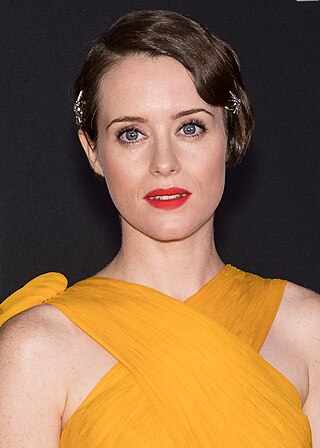
Claire Elizabeth Foy is a British actress. She is best known for her portrayal of Queen Elizabeth II in the Netflix drama series The Crown (2016–2023), for which she received various accolades such as a Golden Globe and two Primetime Emmy Awards.
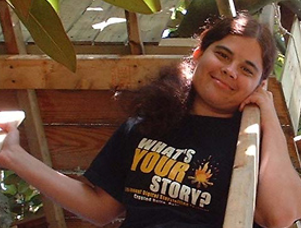
Deena Larsen is an American new media and hypertext fiction author involved in the creative electronic writing community since the 1980s. Her work has been published in online journals such as the Iowa Review Web, Cauldron and Net, frAme, inFLECT, and Blue Moon Review. Since May 2007, the Deena Larsen Collection of early electronic literature has been housed at the Maryland Institute for Technology in the Humanities.
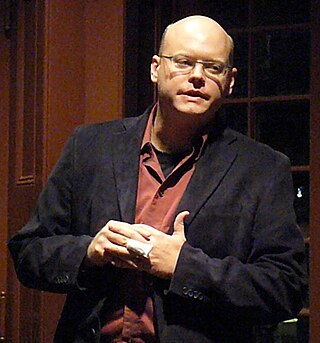
Scott Rettberg is an American digital artist and scholar of electronic literature based in Bergen, Norway. He is the co-founder and served as the first executive director of the Electronic Literature Organization. He leads the Center for Digital Narrative, a Norwegian Centre of Research Excellence from 2023 to 2033.

Figurski at Findhorn on Acid is a hypertext novel by Richard Holeton published on CD-ROM by Eastgate Systems in 2001 and republished on the open web by the Electronic Literature Lab, Washington State University, in 2021. Re-Imagined Radio presented a radio interpretation of this novel in 2022 in which Holeton made an appearance. It is a work of interactive fiction with various paths for readers to choose from, an early example of electronic literature, and one of 23 works included in the literary hypertext canon.

Jill Walker Rettberg is co-director of the Center for Digital Narrative and Professor of Digital Culture at the University of Bergen. She is "a leading researcher in self-representation in social media" and a European Research Council grantee (2018–2023) with the project Machine Vision in Everyday Life: Playful Interactions with Visual Technologies in Digital Art, Games, Narratives and Social Media. Rettberg is known for innovative research dissemination in social media, having started her research blog jill/txt in 2000, and developed Snapchat Research Stories in 2017.
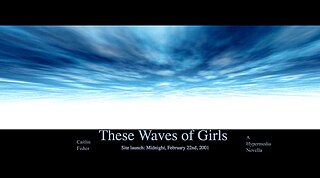
These Waves of Girls is a hypermedia novella by Caitlin Fisher that won the Electronic Literature Organization's Award for Fiction in 2001. The work is frequently taught in undergraduate literature courses and is referenced in the field of electronic literature as a significant example of early multimodal web-based hypertext fiction, placing Fisher "at the forefront of digital writing".

Six Sex Scenes is a hypertext novella created by Adrienne Eisen and published on the web in 1996.
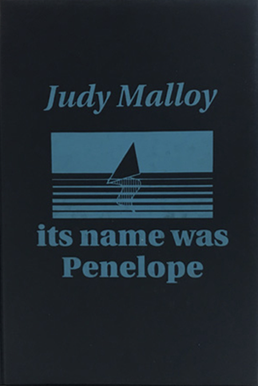
Its Name Was Penelope is a hypertext fictional story created by Judy Malloy and published in various versions, including 1993 by Eastgate Systems. The work makes use of digital elements such as randomized passages to tell the story of the main character's life.
Of day, of night is an interactive digital story by Megan Heyward which uses hypertext and other digital elements to tell a meaningful narrative. It was first published in 2000 by the Australian Film Commission, and then published on CD-ROM by Eastgate Systems in 2002.
Tramway is a combinatorial and interactive poem by Alexandra Saemmer, first published in 2000 and recreated in 2009. Its central theme is the act of closing the eyes of her father on his death. Tramway, by Alexandra Saemmer is a multimedia hypertext work based on her experiences with her father's death. This work is a notable use of Flash as a transitory medium and the content was designed to degrade as computing power increased. It is written in French.
Carolyn Guertin is a Canadian artist, scholar, and author. Guertin is known for critical writing related to cyberfeminism, born-digital arts, participatory cultures, theoretical work in emergent media arts and literatures, global digital culture, information aesthetics, hacktivism, tactical media, and the social practices surrounding technology.
References
- ↑ Vickers, Amy (2001-02-01). "Freeserve adds short films to website". The Guardian. ISSN 0261-3077 . Retrieved 2023-04-22.
Online Caroline became an instant hit and proved to be so compelling for its audience that thousands emailed her, phoned her, sent photographs, and, in a few cases, even phoned the police when they were worried about her boyfriend's behaviour.
- ↑ "BAFTA Awards". awards.bafta.org. Retrieved 2023-04-22.
- ↑ Walker, Jill (2006). "How I Was Played by Online Caroline". First person : new media as story, performance, and game. Noah Wardrip-Fruin, Pat Harrigan. Cambridge, Mass.: MIT Press. pp. 302–309. ISBN 0-262-23232-4. OCLC 52086546.
- ↑ Cole, William (2001-09-10). "Choice vs. Interaction". Proceedings of the twelfth ACM conference on Hypertext and Hypermedia - HYPERTEXT '01. New York, NY, USA: Association for Computing Machinery. pp. 69–70. doi:10.1145/504216.504237. ISBN 978-1-58113-420-9. S2CID 31126397.
- 1 2 Rettberg, Scott (2019). Electronic literature. Cambridge, UK. p. 168. ISBN 978-1-5095-1677-3. OCLC 1028213515.
{{cite book}}: CS1 maint: location missing publisher (link) - ↑ Rustad, Hans Kristian (2008). Tekstspill i hypertekst : koherensopplevelse og sjangergjenkjennelse i lesing av multimodale hyperfiksjoner (in Norwegian). Universitetet i Agder. pp. 30–32.
- 1 2 Walker, Jill (2003). Fiction and interaction how clicking a mouse can make you part of a fictional world (Doctoral thesis). University of Bergen. pp. 65–83. hdl:1956/1040.
- ↑ Harvey, Tom (2000-06-05). "Has Caroline got her hooks into you yet?". The Guardian. ISSN 0261-3077 . Retrieved 2023-04-22.
- ↑ "New media closes in on film and TV". Independent.ie. 2000-10-31. Retrieved 2023-04-22.
The actor who plays Caroline's psychotic boyfriend says he has been amazed by the "weird reactions from the public, especially the Americans who don't appear to understand it's not real!"
- ↑ "ENGLISH 5023 X2 syllabus". studylib.net. Retrieved 2023-04-22.
- 1 2 Topham, Gwen (2000-04-13). "Caroline tries to soft soap surfers | Technology". The Guardian . Retrieved 2023-04-22.
- ↑ Teather, David (2000-04-17). "Meet Caroline. Snoop around her flat, email her, then send her flowers". The Guardian. ISSN 0261-3077 . Retrieved 2023-04-22.
- ↑ "Online Caroline | ELMCIP". elmcip.net. Retrieved 2023-04-22.